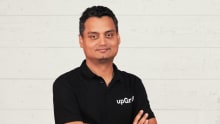HR is moving from being feeling based to being insight based

Transformation is important but transformation is also painful. As our world of work undergoes transformation, everything around us needs to change- our skill sets, the technology we use, the way we use technology to hire, engage, and upskill workforce. Because if we don’t change, the future of our jobs might not have a future at all.
How do we then equip ourselves to be ready for our transforming future? Geetha Ghaneckar, CHRO, Raheja Universal Pvt Limited (RUPL), a transformation expert who was instrumental in a massive culture transition and restructuring effort previously at Raymond Lifestyle Business believes the future of HR is getting rewritten as we speak.
In an exclusive interaction with People Matters, Geetha throws light on how HR can step up to make a meaningful contribution in these times of transition.
How has the role of HR changed in this dynamically transforming world of work?
I think there are 3-4 major themes that are shifting in a big way and these are not incremental shifts but are like huge leaps. One of them is the digital avalanche as one might call it. The impact of technology on the way we do things and the way we work across all spectrums of activities, not restricting to one area of work alone.
The second one for India, in particular, is the demographic shift. The number of younger people coming into the workforce is staggering on one end and Gen X and baby boomers not having yet exited the workplaces, on the other. Most organizations that have been in existence for a few decades are dealing with a multi-generational workforce dynamics that makes the HR job all the more difficult.
The third big one is diversity and inclusion. I think that piece is getting more and more critical. There’s need of more and more dialogue, conversation, participative discussions and an inclusive environment that one needs to create by talking about it more often. And when I say diversity, I don’t mean necessary gender alone, it’s the difference in thought processes, social and educational backgrounds etc.
The fourth major shift is the piece on analytics and data.
HR jobs are moving from being all common sense and feeling based to being insight and information based.
Everything administrative or repetitive will be managed by technology be it payroll, or managing the employee lifecycle related actions, or a compensation program. Chatbots will make it very easy to handle employee’s queries in real time. Hence all of this will be taken out of HR’s basket of work, giving them more time and energy to do a more meaningful value-adding contribution.
How does this transition affect the way HR functions and the required skill sets to make a meaningful contribution?
The great part of this transition is that HR’s time is now freed to do some real work on the ground. Unfortunately, not everybody is equipped to that job. It requires new skills, capabilities, and attitudes. You need to understand the market and industry that you are in as well as your business leaders, and have the ability to predict how the changes in the environment will impact the business and prepare for that. This requires tremendous learning ability.
What we knew yesterday is not relevant today and what you know today won’t be relevant tomorrow.
HR leaders need to set up a system which can help them dive deeper into the data to derive insights which need to be used to impact differently. And then present the data in a way that suddenly nobody can ignore or refute it. So it’s one thing to ace the data and excel sheets and another to draw insights from it that can be used to either corroborate a hypothesis or to disprove it, present it to business teams as solutions or warning signals or opportunities as the case maybe.
Is RUPL doing something differently to develop capabilities in its employees in order to help them sail through these transforming times?
We are making some definite investments in learning and capability building. We are in a brick and mortar industry literally, so most of the training is on the job in real time. Here I am not only referring to technical training for those at the sites but also to the learning that is taking place as we transition to digital platforms in some functions. Or when we are benchmarking and implementing new standard operating processes across all major functions etc.
We are also investing in building some new conceptual understanding of design thinking. In addition, selective investment for identified talent across functions is being done to build their functional and leadership capability.
Interestingly the construction industry in India also hasn’t changed dramatically over the last several decades as much as it has in the last few years. We have had regulatory changes with RERA, then GST came along followed by significant economic volatility. The industry is going through a serious churn and we believe that those who will manage to survive this are the ones who will learn and change fast, build capabilities to manage in a new era.
We will work towards building an ecosystem that integrates design, engineering, and technology to create differentiated user experiences across our projects. Towards this, we are building people, process and technology capability.
What do you do differently to create engagement in the real estate sector?
Engagement in my understanding works around two pillars – the quality of the job and the manager.
If you are not happy with your job and what you are doing, no matter what other things you may do, it is not going to engage an employee for any sustainable period of time.
At RUPL, that’s where am putting all my focus on. Can I structure jobs in a way that the employee can see how they are adding value? If I come to work every day and I know what I am doing is adding up to creating something beautiful and enduring, something that is going to leave a legacy, then that’s real engagement.
Second is the manager. It’s easy to see which manager inspires and engages and who depletes team energy, who supports and protects and who pushes down the blame, who develops and coaches and who leaves you to your own fate. While it is very easy to spot, it is difficult to shift them in a meaningful way because these behaviors are formed over years. But I believe awareness is the first step to making any personal change. So currently my effort is to bring it to their notice, create enough data points so that they can see it and believe it for what it is, and admit that some things are not working and hence the need to change.
What is the future of jobs in real estate? How do you see real estate jobs changing over coming time?
The future of jobs in real estate is a tricky question to answer now. The full impact of RERA and regulatory changes that happened last year is being felt. We are seeing some mergers and acquisitions happening, there is downsizing, projects not taking off as expected or projects being shelved or organizations being brought over and the new company doesn’t require the same skill set and so on. This has made a lot more talent available out there.
While there is no shortage of talent, there are probably more people out there than the jobs at the moment. But the dichotomy here is that if you are looking for a very good talent in the niche area you will struggle to get the right fit. Going forward there will be a premium for talent who can multitask or bring width as much as depth in their competencies.
Organizations are becoming boundary-less. Talent that can navigate the demands of a seamless organization where functional silos are nonexistent and move fluidly as the need may be, will also be in demand.
How do you define good culture fit at RUPL? What are some of the criteria when you are looking for the right fit?
Our culture is extremely people and performance-centric. There are some important aspects we look for during our hiring process. The first one is a high sense of accountability- somebody who’s willing to make decisions & be accountable for those decisions and not play blame games. Our nature of work is extremely interdependent and it’s easy to blame some other department or team member when something goes wrong. So we look for people who can own up mistakes and take responsibility to correct them.
Secondly, we look for people who can work in a collaborative space well, someone who can take people along in the journey rather than stand apart. Lastly, we look for a bias for actions-someone who can get things done or to really take charge of making things happen.











